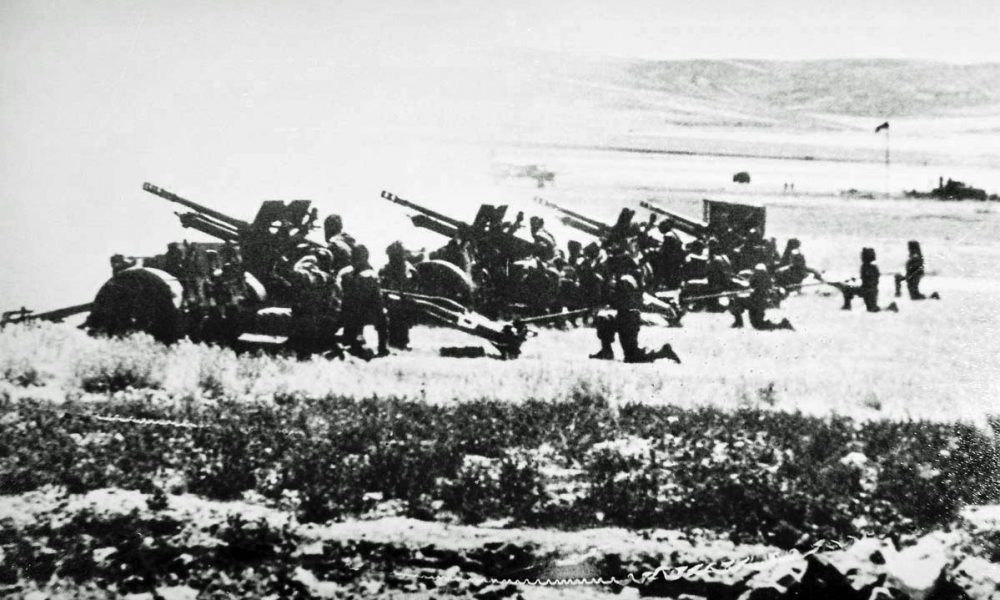Just before dawn on March 21, 1968, our elite reconnaissance unit—the tip of the spear of the Israeli Army Paratroopers Brigade—took off in several helicopters, on our way to cross the Jordan River into Jordanian territory. We were in the air when the Israel Defense Forces began its first major operation against the Palestine Liberation Organization, who’d established its main base near the Jordanian town of Karameh. I was a young second lieutenant back then, commanding a platoon of soldiers. Our mission was to block the escape route of Palestinian fighters, capture or kill them. As I recall, my platoon happened to be engaged in the fiercest battle our company had encountered that day. We lost four young soldiers on the battlefield, among them an officer, a dear buddy of mine. As for me, after unwisely coming into contact with two flying bullets, I ended up in a Jerusalem hospital.
Though the Palestinian fighters (with considerable help from the Jordanian Armed Forces) suffered far greater casualties, dead and injured, and though this battle—directly or indirectly—brought upon them the disaster of “Black September” and forced their relocation to Lebanon, according to their legend the “Battle of Karameh” was a great victory. Likewise, Israeli army historians, soldiers and officers don’t consider “Operation Inferno” a successful operation. The reasons for that, in an operation that came close on the heels of the monumental victory of the Six-Day War—a war in which our unit had participated, both in the Egyptian and the Syrian fronts—are varied. The reason for this piece, however, is not to reminisce, or to analyze the success and failure of that major battle.
The reason is altogether different, and pointing at a much greater failure on Israel’s part. We didn’t know that at the time, but with the passing of the years it became clear that the core idea behind that operation, and many others to follow, was the belief that we Israelis can solve our dispute with the Palestinians by first vanquishing them in the battlefield. If only we’ll be stronger militarily—if not morally—the problem will somehow solve itself. Of course, it never did. Furthermore, back then most Israelis didn’t even know—or acknowledge—that there was such a thing as Palestinians. Case in point: we young soldiers. All we knew was that we were fighting terrorists, whose sole aim was to annihilate Israel. When Prime Minister Golda Meir claimed—she was not alone, mind you—that “there were no such thing as Palestinians,” it fell on welcoming ears.
The same cannot be said regarding the Palestinians’ attempts to dispel this notion. Last year, among the many words written about the 50-year anniversary of the 1967 war, a story came to light of how, before the guns were even silenced, a prominent Palestinian lawyer had offered the Israeli government a detailed two-state peace plan with the Palestinians (who played no part in that war), supported by 50 Palestinian dignitaries. I first read this story here in Moment Magazine; confirmed later by another, Israeli source. In both versions, the detailed peace plan between Israelis and Palestinians, as put forward by Aziz Shehadeh, was never even discussed by the Israeli government, let alone replied to. A trend that has continued to date; most notably regarding the Arab League’s Peace Initiative of 2002.
Yes, the Oslo Accords were signed. And yes, some of that plan’s directives had been partly achieved. But not the ultimate prize: a Palestinian state living side-by-side with Israel, in peace and security for all. A young Israeli, religious-extremist of the worst kind, made sure of that. He assassinated Prime Minister Yitzhak Rabin on the altar of peace, aiming for the conflict to remain unsolved, for the occupation and settlements to continue, for Israel’s control over the West Bank and Jerusalem to remain eternal. It’s why I consider the two-state solution—the best option of solving the conflict—no longer viable. Just as sometimes we hear of people who miraculously, after years in coma, suddenly spring back to life, so we can unreasonably hope that this solution, on its dying bed for some years now, also would.
But I wouldn’t bet on it. True, Israel made some unrequited overtures towards the Palestinians, but those claiming it proves Israel’s sincere wish for peace are missing the point. The point being: Israel had the power and means not to settle the occupied land, to withdraw to acceptable, secure borders and to maintain military control over the territories until final peace agreement had been reached and had been established on the ground. But Israel’s interest in peace came—still does, unfortunately—second to settling the land and solidifying the occupation. Israel could have prevented the conundrum looming large now: a binational state—which either won’t be a Jewish state anymore, or won’t be a democratic state. The grand illusion that it can achieve both, while preventing the Palestinians from having their own legitimate national aspirations realized, is not only a false narrative, but also an affront to Zionism.
Hillel F. Damron is an author of novels and short stories, a director of films and videos and a blogger of cultural and political commentary.

